Boreen is a word used frequently in rural Ireland. It's a beloved term, conjuring homesickness and nostalgia for many.
But have YOU ever wondered what this frequently used little word means?
And so, today I thought we might explore, WHAT is a boreen?
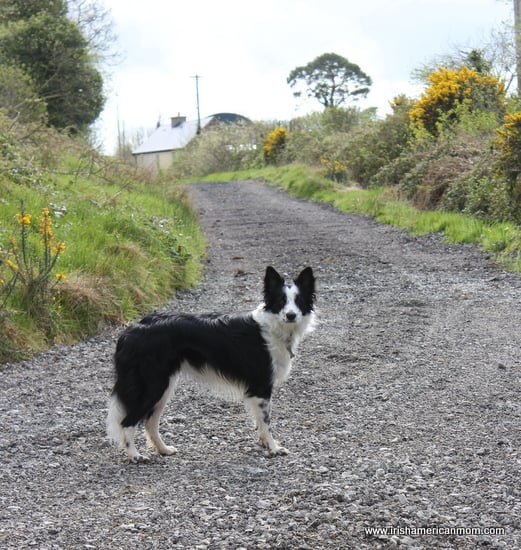
Table of Contents
Origins Of The Word Boreen
The word 'boreen' literally means "little road" and it's part of the language of the Irish landscape, passed down to us from our ancestors.
Bóthar, pronounced bow-her, is the Irish word for road.
Boreen or Irish bóithrín, is the diminutive of bóthar road. It truly is a small, narrow rural road in Ireland.
The Irish word for cow is bó, which is pronounced bow. And the word for over is thar, prounounced har. The word for road came from cow and over - a way for taking cows over to another field. Irish roads were originally cow paths. And that's the etymology of the Irish word for road.
Now the suffix -ín in the Irish language, and -een in English, means small.
Noreen means little Nora, Maureen or Máirín is little Máire, and Seáinín is little Seán.
This Irish inspired diminutive suffix -een normally signifies smallness or endearment.
Boreen is a word found in the English dictionary, but its roots are firmly Irish.

Boreen As An Example Of Hiberno-English
Boreen is a good example of Hiberno-English, which is the English language as it is spoken in Ireland.
The Irish language holds a huge influence over the traditional English dialects spoken throughout the island of Ireland. The Irish inspired suffix –een became established over time in vernacular Hiberno-English, and this is especially evident in the western counties of Ireland.
Here's an example of a sentence you might hear anywhere along the Atlantic coast of Ireland -
"I'll have a dropeen of milk in my tea, to go with a biteen of bread."
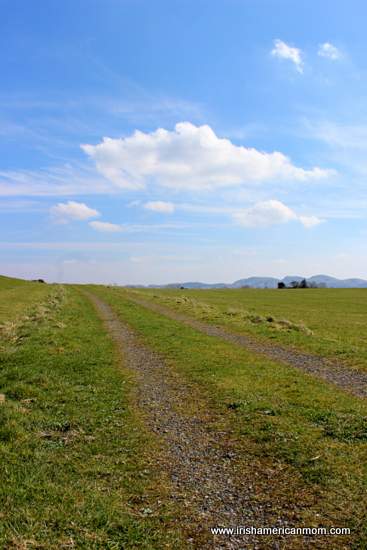
Our Irish conversations are speckled with residual Irish words and boreen is one such word which is standing the test of time.
In Ireland, the language used to describe the natural world and environment, has been inherited from our ancestors.
But I'm sad to report this colorful vocabulary is changing so fast, that many Irish language words used in day to day conversation, are being lost each and every decade.

Language of Ireland's Past
To tell you the truth an Irish person's age can probably be predicted based upon the words they choose to describe the landscape around them.
With each passing decade, fewer and fewer of our favorite words can be understood by the younger generations in Ireland. Even my own children do not understand many of the words I use.
"What are you talking about, mom?" is a frequent chorus in our house.
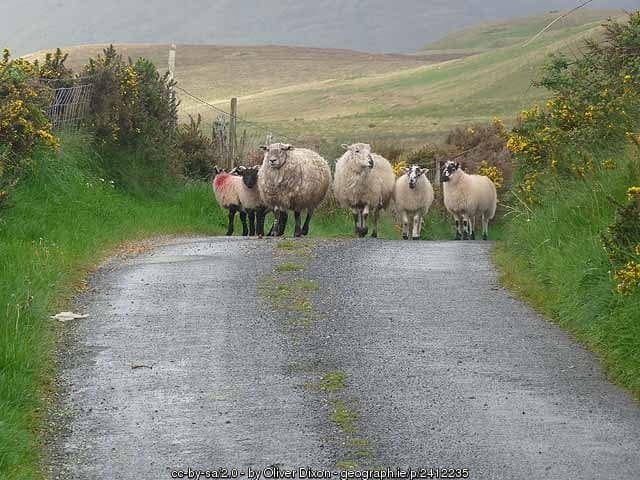
I hold fond, nostalgic memories of conversations with my grandmothers as we wandered east and west along the boreens of beautiful County Cork.
The words of my rural grandmothers would be meaningless to my American born children.
Together, we looked over the 'cluans,' or meadows between trees.
I knew where the bánóg (pronounced bawn-ogue) was, where dances were held in olden times, since it referred to a level patch of grass.
My Donegal husband often took the boreen over the brae, a small hill, where he comes from.
And in Galway they look out over the cleggans, spreading in finger-like projections into the Atlantic Ocean. Our predecessors looked at these promontories stretching out into the ocean and thought they looked like skulls.
And so to describe this landscape, they chose the Gaelic or Irish word 'cloigeann' which literally means head or skull. And from this Irish word, the Hiberno-English term 'cleggan' was born to describe a peninsula or promontory.

Unique Gaelic Vocabulary
But I'm afraid to report these words we borrowed from the Irish language are disappearing at an incredible pace.
Our unique Gaelic vocabulary used throughout Ireland in years gone by, even when speaking English, is being cast away along the highways and byways of this lovely island.
These lyrical, descriptive words are disappearing at an alarming rate, never to be heard again over the hedgerows and ditches of Ireland's boreens.

However, I'm happy to report, 'boreen' is no such dying word.
Its use is alive and well, especially in the southwest of Ireland around Cork and Kerry, where people travel hither and tither along the boreens of the Irish countryside.
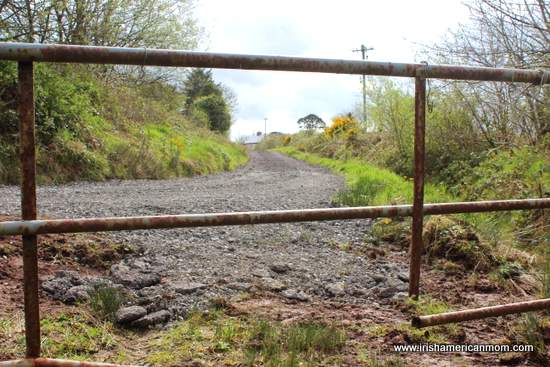
Now to truly qualify as a boreen, rather than an actual road, the center of the route should boast a grass verge.
Grass-ridged, rural boreens are iconic symbols of Ireland.
The Old Boreen - Irish Folk Song
And of course, boreens feature in traditional Irish folk songs.
One such song that comes to mine is called, The Old Boreen, and was often performed by the Irish duo, Foster and Allen. Here's a verse....
"I love to ramble down the old boreen,
When the hawthorn's blossoms are in bloom
And to sit by me gate on that auld mossy seat
Whispering to Kate Muldoon."
~ From The Old Boreen by Foster and Allen
These narrow, often unpaved roads, found throughout rural Ireland, are part of our Irish cultural heritage.
A boreen also features in the Irish folk song called, The Star of the County Down.
"Down a boreen green came a sweet colleen,
And she smiled as she passed me by."
The boreen has romantic connotations in Irish culture. Don't you just love how boreen and colleen rhyme.
Famine Relief Roads
In the western counties of Ireland you will see strange road patterns on the sides of mountains.
Small roads criss-cross the Irish landscape, scarring the hillsides, climbing the slopes and suddenly stopping. Some of these roads lead to nowhere, terminating as a dead end, right in the middle of nowhere.
Many of these small roads or boreens were built at the time of the Great Irish Famine.
The English government set up relief or public works to provide employment for the Irish peasantry. English policy dictated that charity could not be handed out without a fair exchange. The impoverished Irish could only provide labor as payment for food aid.
This economic theory of the day was called laissez-faire, which is a French term, meaning let things be.
This philosophy meant the weak, starving and dying Irish people had to toil in the dead of winter to receive any form of compensation or charity.
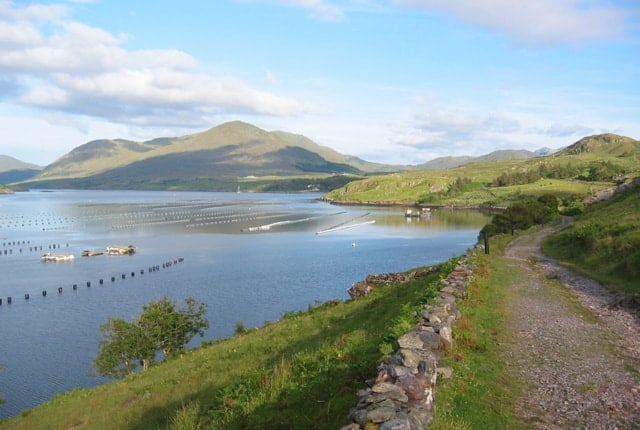
In addition, any roads built could not interfere with other economically beneficial projects, so often the roads built led to nowhere.
Over 150 years later, these small roads built by our ancestors remain. They stand as visible reminders of the greatest hardship ever endured by the people of Ireland.
The Irish countryside bears witness to the past and some of our boreens are evidence of our tragic history. Every time I pass a mountain boreen, I wonder if it was built at the time of the Famine.
Boreen Family Name in the USA
Did you know that there is a last name or surname "Boreen" which is found around Tennessee.
This name comes from Scotland, and does have Gaelic origins.
In 1840, there was only one family with the last name Boreen in Tennessee, but by the 1920's this had grown substationally.
And there you have it. A look at the meaning and significance of Irish boreens, those narrow country roads that stir fond memories for many of us.
Thank you for joining me today on our nostalgic stroll down our boreen of Irish life.
And thank you to everyone who follows my recipes and ramblings.

Slán agus beannacht,
(Goodbye and blessings)
Mairéad -Irish American Mom
Pronunciation - slawn ah-gus ban-ock-th
Mairéad - rhymes with parade
Here are some other posts you might enjoy ....
You may wish to add this post to your Pinterest boards, so here is a pin friendly image....

Here's another image you may like to share through Pinterest....

And you can explore more ramblings about Irish life and culture here.
Why Tourists Love Ireland
- An Irish Tour Following in the Footsteps of Saint Brigid
- Why Are Irish Americans So Captivated By Ireland?
- Why Do People Kiss The Blarney Stone?
- Hillwalking In County Donegal
Crafts
- Homemade Plaid Shamrock Decoration for Saint Patrick's Day
- Wine Cork Shamrock Craft for Saint Patrick's Day
- DIY Shamrock Pop-up Card for Saint Patrick's Day Greetings
- Paper Strip Shamrock Mobile Craft with Printable Tutorial




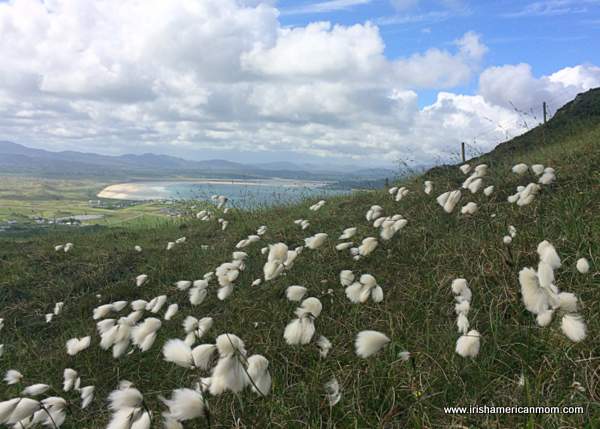
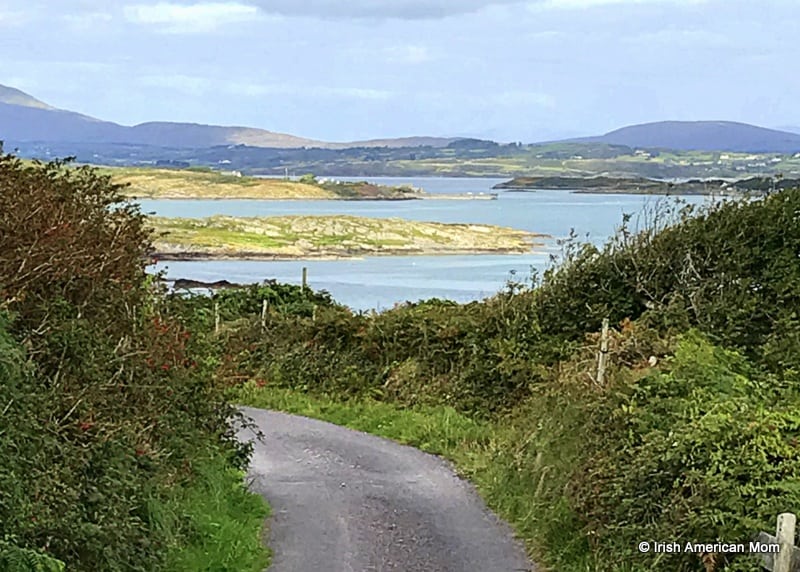
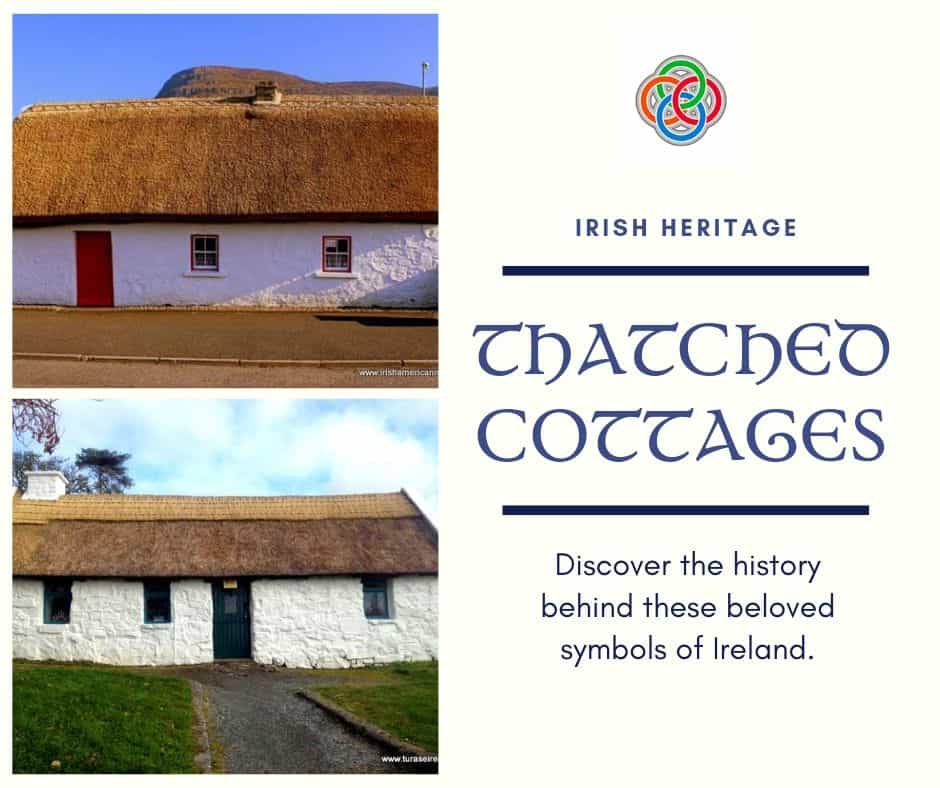





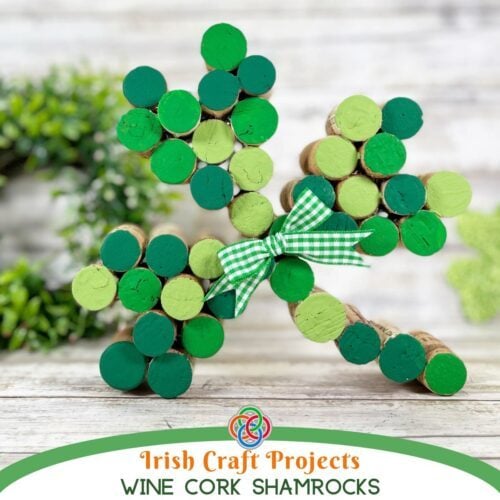













Penny Wolf
Roads to nowhere. I can't even.....hackles raised!
Irish American Mom
Hi Penny - It's hard to comprehend the crazy mentality of those in charge back then. Thanks for checking out this ramble down Ireland's boreens.
All the best,
Mairéad
Tom Porter
My father used to say'; "Ok. I'm off to the shebeen!" Meaning the American Legion or the VFW.
Irish American Mom
Hi Tom - what a lovely memory of a truly Irish expression. I’m sure your father had some good times and chats with his friends at the ‘shebeen.’
Best wishes,
Mairéad
Jeff
Mairéad,
Thanks for sharing this little piece of the Irish vocabulary and culture with us. I just wish that I could be over there and try to speak some of your beautiful language!
Jeff
Irish American Mom
Hi Jeff - I'm glad you found this piece informative. Irish is a beautiful, lyrical language. I hope it survives for the decades to come.
All the best,
Mairéad
kathy McCasey
Mairead,
Thank you for your detailed descriptions of life, landscape, words and traditions of Ireland.
I don't believe I will ever get there in person, but my heart has been there since I was a small child.
Your blog, always, seems to give me "certainty" that I know what it would have been like to live, there, and continues to dazzle and draw me even closer to Ireland.
It makes me sad, too, that things are changing and will be lost forever.
History is who we are, and I pray it that folks start realizing how important it is, before its too late.
God bless you for making the time to share with us and thanks again.
kathy
Irish American Mom
Hi Kathy - Many thanks to you for reading my ramblings. I'm delighted to be able to share a little piece of Ireland with everyone who stops by this Irish American corner of the internet. I believe it's important to record our history, and not just the big events that happen in a country. We can create a social history through our stories, recording the evolution of our thoughts and views through our experiences and memories. I hope some of my writing here will be there for my children when they reach an age when they can appreciate the importance of cultural heritage.
All the best,
Mairéad
Maureen Koebel
Thank you for the pictures, history, and description of the word boreen. Roads to nowhere 🙁
I look always forward to your blog posts.
(I am an "een" myself because of my August 15th birthday)
Irish American Mom
Belated birthday wishes, Maureen. I hope you had a lovely day.
Thanks for checking out this post about boreens and for your kind words about my blog.
All the best,
Mairéad
Marilyn
Thank you for this interesting post. I am a boreen. My Confirmation name is Kathleen.
Marilyn
Irish American Mom
Hi Marilyn - Kathleen is a truly Irish name with it's -een suffix. Thanks for reading my ramblings about boreens.
All the best,
Mairéad
Marion
Mairead this is such a wonderful post. It is so interesting and informative about our Irish Heritage.
Thank You so much.
Marion
Irish American Mom
Hi Marion - Even the little country roads in Ireland are an interesting part of our heritage. Thanks for checking out this little history lessons about Irish boreens.
Best wishes,
Mairéad
Joan
Mairead, thank You for this glorious post. I love all things Irish. I try to read as much books on Ireland as possible. Your posts give me valuable and educational information concerning Ireland and the traditions and history. God Bless.
Joan
Irish American Mom
Thank you for reading my posts about Ireland, Joan. Thank you also for your kind words and for all your support. I'm so glad you find my posts informative and interesting.
All the best,
Mairéad
Mary Naughton
Thank you so much for this informative piece. My parents, one from Cork and one from Roscommon, always talked about the Noreen’s. Also , both my mother and daughter’s name was/is Nora but both have always been Noreen to all who know them.
Irish American Mom
Hi Mary - Thanks for checking out this rambling post down the boreens of Ireland. Noreen is a lovely Irish name - one that isn't being used much in modern times, but will probably have a revival just like the name Aidan in recent years. Thanks so much for stopping by.
All the best,
Mairéad
Lynn
Thank you for this fascinating information. I love reading about different countries and cultures, and your blog is one of my favorites. Language and how it's used is always interesting, and I hope all languages will be preserved forever. It would be a shame to lose any of them.
I have friends from different countries, and although they often try to speak to their children in their native language, their children typically reply in English, or even tell their parents to speak English instead. My friends are trying to entice their grandchildren to learn their language, but the grandchildren aren't interested--yet. Maybe some day.
Here in Washington state, out in the country, we also sometimes have roads that suddenly end, for no apparent reason, so I smiled when I read that happens in Ireland, too. GPS is no help at times, especially when we're told to make a turn and eventually find ourselves in a cow pasture instead of our intended destination. 🙂
I'm sorry the roads to nowhere in Ireland are sad reminders of a cruel time in history, but I'm glad many lived on to enjoy better futures for themselves and their descendants. We can't change history, but hopefully we can learn from it and not repeat the wrong and evil actions from the past.
Irish American Mom
Hi Lynn - I have often heard people say there are many similarities between Washington state and Ireland, including the rainy weather. I've never visited your beautiful state, but my husband goes there for work often, and he loves it. He even climbed Mount Rainier one time he was there.
Thanks for letting us know that you too have roads to nowhere in Washington state. It's a rural thing, and GPS satellites just can't figure it out. When a GPS starts guiding you to roads that keep getting narrower and narrower in Ireland, there's a rising chance you'll end up on the back of some forlorn mountain. It's important not to follow directions blindly without looking at the complete route.
I agree with you wholeheartedly about the importance of learning from history. It's so important we do not repeat the wrongs of the past.
Best wishes,
Mairéad
Cheryl Barker
Thanks for sharing about these little Irish country roads, Mairéad. Loved hearing about them! I love traveling down country roads, especially the one that takes me to my youngest set of twin grandsons 🙂
Irish American Mom
Hi Cheryl - Those country roads that take us to family are the nearest and dearest to our hearts.
All the best,
Mairéad
Barra the Bard / Barra Jacob-McDowell
Mairéad, Now I understand something my late husband said to me on our honeymoon, almost 32 years ago! John was Scots-Irish, and we had come to my family's home in northwestrn New Jersey, because the only member of my family who could not attend our wedding in Pittsburgh was my brother, whom John wanted to meet. And I was happy to show him where I grew up; I still love those mountains despite all my years away. On our way, I directed him off the interstate and eventually our route took us through the vlllage of Broadway. "Oh, look!" I cried, "It's still there! I love those old humpbacked bridges, but most of them have disappeared." John glanced over at it, choked withe weeds and ivy, but still visible; it was about 20 feet off the road. A couple of minutes later, we saw another ; that one was cleaner, so you could really see the stonework. It was in a yard. "I don't get it," John said. "Why aren't they *on* the road?" "That's why so many have vanished," I answered. "They were built a long time ago, barefy wide enough for a wagon, and as traffic increased and roads widened, they were replaced by more modern ones. Mother told me that these two are fairly modern, built by the WPA during the Depression. It was make-work, really; they paid the locals to make them. Someone wanted to be able to cross the brook dryshod. Mostly, though, the WPA built buildings. The library in Hackettstown (my hometown) was one of them." That's when he said, "Oh, a kind of boreen!" I immediately asked him what he meant, and he shook his head. "I don't know, but it's what the Neals (his mother's family) and McDowells would have said." I'm a Celtic storyteller (Celtic with a "k"sound, not the "S"), specializing in Scottish and Welsh tales and tunes (my heritage on my mother's side) and I also play Celtic harp. I do tell Irish tales--I have a couple of Irish programs lined up already for St. Patrick's Day--and will take pleasure in using the word in at least one tale! Thank you!
Irish American Mom
Hi Barra The Bard - I thoroughly enjoyed reading your story about how your husband expected roads to go over the old humpbacked bridges from years ago here in America, just like they still do in Ireland. I'm so happy this post explained his expression 'boreen.' Many thanks for stopping by and wishing you all the best as you continue the ancient Irish art of storytelling.
Mairéad
Jose Wallace
My father, Edward Wallace, who was born in Multyfarnham, Co. Westmeath in 1889 and emigrated to Argentina in 1915, wrote these verses with the melody of a song entitled "The Irish Brigade"
“The Auld Boreen”
There’s a long winding lane, just a quaint auld boreen,
By it’s side ever ripples, a bright little stream.
As it inurmurs along, with melody and song,
Sure it’s memory reminds me of days that are gone.
Chorus:
Every day, everywhere, and at nigh oft I dream.
That my soul havers there, o’er that magic scene,
Having the music of that little stream,
Flowing on day by day the auld boreen.
The stranger, who passing, it may not appeal,
It awakens no kind thought, his heart now might feel.
Of a friend long departed, or some sweet colleen,
He had known or had roamed with, down the boreen.
Chorus:
And I pray that some day, I’ll go back there again,
Just to meet and to greet the few friends who remain.
And I’ll walk once again where my old haunts hath been,
Down the long winding lane, the dear auld boreen.
Edward Wallace
Born Westmeath 1889
Died Venado Tuerto, Argentina, 1980
Irish American Mom
Hi Jose - Your father's song is beautiful. It brought a tear to my eye as I read these nostalgic verses. Thank you so much for sharing it with us here - I treasure these contributions from readers like you and love learning about where Irish people settled all over the world. I have read about the many Irish men, especially from County Westmeath, who immigrated to Argentina in the early 20th century. It's a story I must share on my blog someday soon. Your father's song truly illustrates how Ireland was dear to his heart, even though he lived many miles away.
Thanks again for stopping by and for so generously sharing your father's song and story.
All the best,
Mairéad
Brian Groves
That is truly beautiful, perhaps we may hear it on YouTube someday.
Irish American Mom
Hi Brian - Wouldn't that be wonderful to hear this lovely piece performed. Thanks for checking out this rambling post down the boreens of Ireland.
All the best,
Mairéad
Monika
Lovely blog posts Mairéad! I lived in Ireland for a short bit a few years ago and upon returning to the U.S., I've felt a yearning to go back to Ireland for a more permanent basis. I try to return once a year if I am able at least just for a short visit (unfortunately I was supposed to go in March and that of course has been postponed). Thank you for sharing your thoughts and memories and history - it's lovely to read and learn!
-Monika
Irish American Mom
Hi Monika - I'm so glad you enjoy my ramblings about Ireland, and that they bring back memories of the time you spent living there. How lovely that you usually get to visit every year. This is a crazy year with so many trips on hold. Thanks so much for checking out my blog - I really appreciate your support.
All the best,
Mairéad
Joan Ross
I also enjoyed roaming the boreen’s of West Cork while visiting our cousins who were so kind to welcome us into their homes. Always with a warm welcome and a hot cup of tea with biscuits.
And when I return home to rural Pennsylvania I am reminded of my travels in that I live on a boreen (or dirt road) as we call them. There is something to be said about both traveling and living on these types of roads. They take us to a calmer way of living which can be very refreshing.
Molly Dennehy
HI Mairead
I enjoyed learning about the roots of language. Mine is a funny story- I was driving in Ireland in Gaelic country up north trying to decipher my way around to visit relatives. After driving many hours straight from Tralee to Rossport. ( Co. Mayo) I needed a break. Even though my husband, a native from Tralee could translate the signs and knew the lay of the land to direct me, it was still quite a tiring drive .As we got close we decided to rest and pulled out nylon chairs from the car to sit near a small bay; we parked ourselves on a grassy boreen and fell asleep - I was the first to quickly awaken to a huge Ram and his long line of women behind him. I poked my husband who sat to my left and quietly said - well, what do I do now? as the ram and I quietly eyed one another. The ram was quite polite and decided to slowly walk backwards directing his herd behind him to lead everyone to a better boreen down below bordering the bay. As we enjoyed watching them all dawdle away along little road near the bay I thought... ' I am just glad it wasn't a male goat like that monstrosity they catch at the puck fair!'. lol
Irish American Mom
Hi Molly - Your story made my day. I laughed thinking about a big old ram staring you down as you sat in your deck chair. Years ago my mother kept a goat on our farm in County Cork. Meg was spoiled rotten. She would walk the boreens and the fields side by side with my mother. When I visited from America, she was very suspicious of me. She did not like the fact that I started to walk the boreens and the fields side by side with my mother. She start to squeeze in between us, to make sure she was above me in the pecking order. When she would see me she'd bow her head as if to tell me, "I could hurt you with this head." You were very lucky your ram decided to dawdle on down the boreen and let you be.
Thanks so much for sharing your story of Ireland.
All the best,
Mairéad
Sara McLain
Dear Mairéad,
I value so much your writings about the language used in Ireland. And this essay about the boreens certainly stirred up my longing heart. For all the beauty of the mountains, loughs, and wild green fields in Ireland that stir my heart, there is something about coming upon a narrow wee road in Ireland, with maybe a bit of grass growing down the middle, that always grasps hold of my own heart in a powerful way. Just a photo on FB will have the same effect, as that little road seems to want to pull me out of my present life and lead me down a road on a new adventure. I've walked enough of those boreens to know now that "your feet will take you where your heart is." Well, I've blathered on enough. Keep up your great work sharing about the customs and intriguing things about the Ireland that you love so well.
Irish American Mom
Hi Sara - I'm delighted to hear you enjoyed this rambling trip down the boreens of Ireland, and they reminded you of how they capture your heart as well. Those central grass verges on little Irish boreens look like fairy paths to me. They're just magical. Thanks for stopping by and for all of your support over the years.
All the best,
Mairéad
Bernadette
How sad and also infuriating about the English "deal" for food, hard labor is something many Irish, if not all, know about in their family tree.
Love the use of words and the combination here. It is sad to know some of the language is being lost or not understood, if only a few keep it going, like you Mairead, maybe one day your children will surprise you!
Irish American Mom
Hi Bernadette - The Irish never got a fair "deal" in the past. Stories of the famine time are so sad. Thanks for taking the time to read this blog post. I love reading about linguistics and the Irish language. So glad you like these topics too.
All the best,
Mairéad
Don
Good day, Irish-American Mom:
I'm sorry to point this out when you already lamenting the loss of many Irish phrases, but this one is becoming too common: the use of "it's" when the word should be "its".
"Boreen's a word found in the English dictionary, but it's roots are firmly Irish. ... It's use is alive and well, especially in the southwest"
The possessive pronoun of it is its. It's means it is, or it has.
Irish American Mom
Thank you, Don. You've definitely spotted to instances of incorrect spelling and grammar. I'll make the changes. I really appreciate your feedback.
All the best,
Mairéad